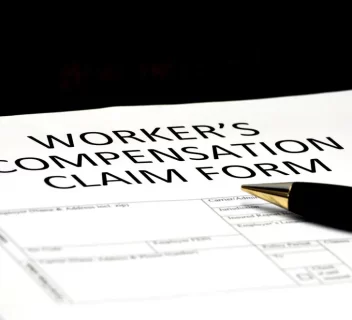Top Workers’ Compensation Facts: Essential Knowledge for Every Employee
Workers’ compensation can help employees get financial support for medical expenses and lost wages when injured on the job. Understanding workers’ compensation facts can help you navigate the process effectively. This article covers key aspects of workers’ compensation, including insurance coverage, reporting injuries, important deadlines, and more.
Key Takeaways
- Workers’ compensation insurance is mandatory for most employers, providing financial support for medical expenses, rehabilitation, lost wages, and death benefits for employees injured on the job.
- Prompt injury reporting is critical for successful claims, as delays can jeopardize eligibility and complicate the claims process for both employees and employers.
- The no-fault system in workers’ compensation allows injured employees to receive benefits without proving employer fault, but exceptions exist for cases involving intoxication or intentional harm.
Workers’ Compensation Insurance Coverage
Workers’ compensation insurance is a mandatory requirement for employers to cover their employees’ injuries sustained on the job. This insurance provides a safety net, offering financial support for medical expenses, rehabilitation costs, lost wages, and death benefits. For injured workers, this means immediate access to necessary medical care without the burden of out-of-pocket expenses.
The coverage is comprehensive, encompassing a wide range of medical costs, from emergency treatments to surgeries and medications related to job injuries. In the tragic event of a workplace fatality, workers’ compensation provides benefits to cover funeral expenses and support for the dependents left behind. This ensures that families are not left in financial distress during such difficult times.
Employers bear the responsibility of paying the premiums for workers’ compensation insurance, ensuring that their employees are protected in case of work-related accidents. The benefits of this insurance are significant, not only for the workers but also for employers, as it helps in maintaining a safe and productive work environment. Understanding the scope of coverage allows both employees and employers to navigate the complexities of the workers’ compensation process more effectively.
Reporting Workplace Injuries
Prompt reporting of workplace injuries is crucial for the success of any workers’ compensation claim. Failing to report an injury promptly can lead to significant challenges in proving the claim and may jeopardize the worker’s eligibility for benefits. Immediate reporting also helps preserve evidence and kickstarts the claims process sooner, making it easier to gather necessary documentation and witness statements.
When an employee is injured on the job, they must report the injury to their employer without delay. This step is essential not only for the injured employee’s benefit but also for the employer to identify and mitigate any safety hazards in the workplace. Employers are obliged to report any work-related injury or illness to the Workers’ Compensation Board within 10 days of awareness. This ensures that the claim is officially recorded and can proceed through the proper channels.
Employers play a critical role in the reporting process. They are responsible for providing injured workers with a Claimant Information Packet when filing claims. This packet contains important facts about the workers’ compensation process and the company employees’ rights and responsibilities.
Timely and accurate reporting facilitates a smoother claims process and enhances workplace safety for everyone, ensuring that data is effectively utilized.
Key Deadlines for Filing a Workers’ Compensation Claim
Meeting the key deadlines for filing a workers’ compensation claim is vital to securing benefits. Different states have varying requirements for how quickly workplace injuries must be reported, often ranging from 24 hours to 30 days. Employees must notify their employer about an injury within 14 days of its occurrence to ensure their claim is valid. Missing these deadlines can result in automatic denial of the claim, leaving the injured worker without necessary support.
For injuries that develop gradually, such as repetitive strain injuries, the filing deadline begins when the employee realizes the condition is work-related. This can sometimes complicate the filing process, as the onset of symptoms might not be immediately linked to work activities. Nevertheless, filing as soon as possible is always the best practice to avoid losing the right to receive benefits.
Timely filing of a workers’ compensation claim is not just about following the rules; it is about ensuring that injured workers receive the benefits they are entitled to. Employers must also adhere to these timelines to avoid complications and potential disputes. Understanding and adhering to these deadlines can make the difference between receiving timely help and facing financial difficulties due to work-related injuries.
No-Fault System in Workers’ Compensation
Workers’ compensation operates under a no-fault system, which means that employees can receive benefits without having to prove that the employer was at fault for the injury. This system simplifies the process, ensuring that injured workers get the help they need promptly. Whether the accident was due to an employee’s negligence or other factors, the compensation amount remains unaffected by any fault.
However, there are exceptions to this rule. If an employee’s injury is caused by intoxication or an intentional act to harm themselves or others, they lose the right to compensation.
The no-fault system also means that workers’ compensation benefits are considered the exclusive remedy for injured employees, preventing them from suing their employers for additional compensation. This framework aims to balance the interests of both employees and employers, promoting a fair and efficient resolution of workplace injury claims.
Employer’s Role in Workers’ Compensation Claims
Employers have a crucial role in the workers’ compensation process, starting with their legal obligation to provide workers’ compensation insurance to their employees. They must comply with state laws regarding workers’ compensation benefits and are responsible for paying the insurance premiums to private insurance companies. This ensures that employees are protected and can receive the necessary support in the event of a workplace injury.
Effective communication is key. Employers should engage with their employees both before incidents occur and throughout the claims process. This includes:
- Providing the necessary information about how to file a claim
- Informing employees about what benefits are available
- Reporting injuries to the Workers’ Compensation Board
- Collaborating with insurance companies to process claims efficiently
In some cases, employers may dispute liability for an injury or illness. When disputes arise, the Workers’ Compensation Board can assist in resolving them, ensuring that the claims process remains fair and transparent. Understanding their role and responsibilities enables employers to maintain a safe work environment and support their employees through the workers’ compensation process.
Types of Disability Benefits
Disability benefits are a critical component of workers’ compensation, providing financial support to employees who cannot return to work due to severe injuries sustained on the job. There are different types of disability benefits, including temporary partial, permanent total, and permanent partial disability benefits. Each type is designed to address the specific needs and circumstances of injured workers.
Temporary partial disability compensates for a reduced ability to work, with payments calculated based on the severity of the disability. For those with permanent total disability, the benefits indicate a complete loss of wage-earning capacity, with no time limit on the payments. Permanent partial disability benefits vary based on the affected body part and measure the permanent loss of earning ability.
Understanding these benefits is crucial for employees as they navigate their recovery and compensation. Temporary disability benefits, for instance, pay up to two-thirds of gross (pre-tax) wages, with a maximum amount of $1,010.50 per week. Knowing what benefits are available helps injured workers plan their recovery and ensure they receive the necessary support.
Permanent Disability Settlements
Permanent disability settlements provide long-term financial support for workers whose injuries have a lasting impact on their ability to work. There are two main types of settlements: lump sum settlements and stipulation agreements. Lump sum settlements offer a single payment to compensate for future benefits, providing immediate financial relief.
Stipulation agreements, on the other hand, allow workers to receive ongoing payments for their injury, with payments defined over a specific period. These agreements also cover future medical treatment, ensuring that injured workers have access to necessary care over time.
The amount of permanent disability benefits varies based on factors such as the disability rating, date of injury, and employee wages. These benefits are paid after temporary disability ends and once a doctor determines the injury has a permanent impact on the worker’s ability to work. Understanding these settlements allows employees to make informed decisions about their compensation and future.
Legal Protections for Employees
Federal and state laws provide robust protections for employees who file for workers’ compensation, ensuring they are not subjected to retaliation at the federal level. Employers are prohibited from discriminating against employees because they have filed for workers’ compensation benefits. This legal framework ensures that workers can exercise their rights without fear of losing their jobs or facing other adverse actions.
The Occupational Safety and Health Administration (OSHA) offers additional protections against retaliation related to health and safety complaints. Some companies also have internal policies that explicitly prohibit retaliation, further safeguarding employees’ rights.
Employees may have extra protections from retaliation based on specific terms in employment contracts or collective bargaining agreements. Understanding these legal protections is essential for employees to feel secure in filing for workers’ compensation and ensuring they receive the benefits and other benefits they deserve.
The Importance of Experienced Workers’ Comp Attorneys
Navigating the complexities of the workers’ compensation system can be overwhelming, especially for those dealing with the aftermath of a workplace injury. Having an experienced workers’ comp attorney can alleviate the stress and improve the chances of a successful claim. Attorneys can handle the complexities of claims, ensuring all paperwork is correctly filled out and submitted punctually.
Hiring an attorney can significantly increase the likelihood of obtaining a higher settlement for your claim. Workers’ compensation lawyers typically work on a contingency fee basis, meaning they only get paid if they win the case. This arrangement makes legal representation accessible to all injured workers, ensuring they receive the maximum benefits allowed for their type of work injury.
For a free consultation, contact 1-800-THE-LAW2 to get connected to a workers’ compensation attorney in our network.
Common Reasons for Workers’ Compensation Claim Denial
Understanding the common reasons for workers’ compensation claim denial can help employees avoid pitfalls and ensure their claims are successful. One major reason for denial is the failure to notify the employer about the injury within the required timeframe. Claims can also be denied if the injury did not occur during work hours or while performing job duties.
Other reasons for denial include attributing the injury to a pre-existing condition not worsened by work, being under the influence of drugs or alcohol at the time of the injury, and not seeking medical treatment. Understanding these factors helps employees take the necessary steps to ensure their claims are valid and successful.
Workers’ Compensation Fraud
Workers’ compensation fraud is a significant issue that undermines the integrity of the insurance system. Fraud can be committed by employees, employers, and even third parties, involving schemes such as false injury reports, exaggeration of injury severity, and organized criminal conspiracies. This fraud poses significant risks to employers and employees alike, impacting insurance costs and benefits availability.
The National Council Insurance Crime Board highlights the prevalence of these fraudulent activities and the need for vigilance. Understanding the types of fraud and their impact helps both employers and employees work towards maintaining a fair and effective workers’ compensation system.
Independent Contractors and Workers’ Compensation
The eligibility of independent contractors for workers’ compensation is a complex issue.
Regular employees usually qualify for workers’ compensation. In contrast, independent contractors seldom have this eligible status.
Certain categories of workers, such as:
- musicians
- crop-dusting airplane crew members
- farm laborers
- real estate agents
- domestic laborers
are exempt from workers’ compensation in various states.
The increasing number of gig workers, which has grown by tens of millions over the last decade, highlights the evolving nature of the workforce. As the workforce continues to change, it is essential to understand the implications for workers’ compensation and the protections available for different types of workers.
Summary
Summing up the key points, understanding workers’ compensation is crucial for protecting one’s rights and ensuring proper compensation in the event of a work-related injury. From insurance coverage and reporting injuries to the types of disability benefits and the role of experienced attorneys, each aspect plays a vital role in navigating the workers’ compensation process.
By being informed about the legal protections, common reasons for claim denial, and the complexities of workers’ compensation fraud, employees can take proactive steps to secure the benefits they deserve. Remember, knowledge is power, and being well-versed in workers’ compensation can make all the difference in safeguarding your future.
Frequently Asked Questions
Immediately report the injury to your employer to preserve evidence and initiate the claims process. Additionally, seek necessary medical attention and document all relevant details related to the incident.
It is crucial to notify your employer within 14 days and file your claim within 30 days of the injury, as deadlines can vary by state, and missing them may lead to the denial of your claim. Always be aware of your state’s specific regulations to ensure compliance.
You can receive workers’ compensation benefits even if the accident was your fault partially, as the no-fault system allows for this. However, exceptions occur if the injury results from intoxication or intentional actions.
Disability benefits include workers’ compensation offerings such as temporary partial, permanent total, and permanent partial benefits, each addressing different injury levels and loss of earning capacity. Understanding these types can help you access the right support for your situation.
An experienced workers’ comp attorney can effectively navigate the complexities of the claims process, significantly enhancing the chances of a successful outcome and securing maximum benefits. Their contingency fee arrangement ensures that they are only compensated if they win your case, aligning their interests with yours.




